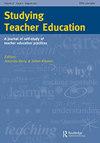一段批判友谊的日记:一位体育教师研究者的教师教育中自学的人诗意蕴
IF 1.5
Q2 EDUCATION & EDUCATIONAL RESEARCH
引用次数: 2
摘要
本文以一首现存的诗歌Árvore(葡萄牙语中的树)为例,结合我们的日记,作为诗歌自学方法的创新。自我学习旨在了解教师研究者发展过程中的审美环节。这是对实证主义理性的背离,也是对人类形成范式的肯定,这种范式通过跨学科的系统认识论将研究、行动和形成联系起来。本研究的背景是来自巴西东北部一所高中和两所高等教育机构的教师研究人员之间的关系。使用反思性的人诗(伦理和美学创造,批判性可能性和教学再造的开放)日记,两位体育教师研究人员在合作自学过程中对其中一人开始教学的复杂性发展了批判性友谊。我们在日记中分享我们的学习,其中的摘录分为三条思路,或者我们称之为反思性的立交桥,内容涉及:生活史,教师教育,以及进入教师研究职业的教学实践。主题类别由Árvore诗的节选来表示。这三个反思性立交桥探讨了教师-研究者的教学知识,这些知识依次汇聚和发散,影响着对方、方法论和实践背景。我们至关重要的友谊有助于通过互动和创造性的交流,开始进入教师研究职业的自学过程。这种诗意的自我学习指出了不同的学习和专业成长路径,增加了用诗歌来理解研究成果的价值和影响。本文章由计算机程序翻译,如有差异,请以英文原文为准。
Diary of a Critical Friendship: Anthropoetic Implications of Self-Study in the Teacher Education of a Physical Education Teacher-Researcher
ABSTRACT This article uses an existing poem, Árvore (Tree in Portuguese), coupled with our diary entries, as a methodological innovation in poetic self-study. The self-study aimed to understand the aesthetic link in the development of being a teacher-researcher. This was a departure from positivist rationality and affirmation of an anthropoforming paradigm that connects research, action, and formation via a transdisciplinary systemic epistemology. The context of this self-study is a relationship between teacher-researchers from one high school and two higher education institutions in the Brazilian northeast. Using a reflective anthropoetic (an opening for ethical and aesthetic creation, critical possibilities and pedagogical reinvention) diary, two physical education teacher-researchers developed a critical friendship in a collaborative self-study process on the complexities of beginning teaching for one of them. We share our learning in a diary with excerpts organized in three lines of thought, or what we call reflective flyovers, regarding: life history, teacher education, and pedagogical practice of being initiated into the teacher-researcher profession. Thematic categories were represented by excerpts from the Árvore poem. The three reflective flyovers explored included the teaching knowledge of the teacher-researchers, which in turn converge and diverge, impacting the other, the methodology, and the context of practice. Our critical friendship contributed to the self-study process of initiating into the teacher-researcher profession through interactive and creative communication. This poetic self-study points to different paths of learning and professional growth, increasing the value and impact of using poetry to make sense of research findings.
求助全文
通过发布文献求助,成功后即可免费获取论文全文。
去求助
来源期刊

Studying Teacher Education
EDUCATION & EDUCATIONAL RESEARCH-
CiteScore
2.40
自引率
43.80%
发文量
23
期刊介绍:
Studying Teacher Education invites submissions from authors who have a strong interest in improving the quality of teaching generally and of teacher education in particular. The central purpose of the journal is to disseminate high-quality research and dialogue in self-study of teacher education practices. Thus the journal is primarily a forum for teacher educators who work in contexts and programs of teacher education.
 求助内容:
求助内容: 应助结果提醒方式:
应助结果提醒方式:


